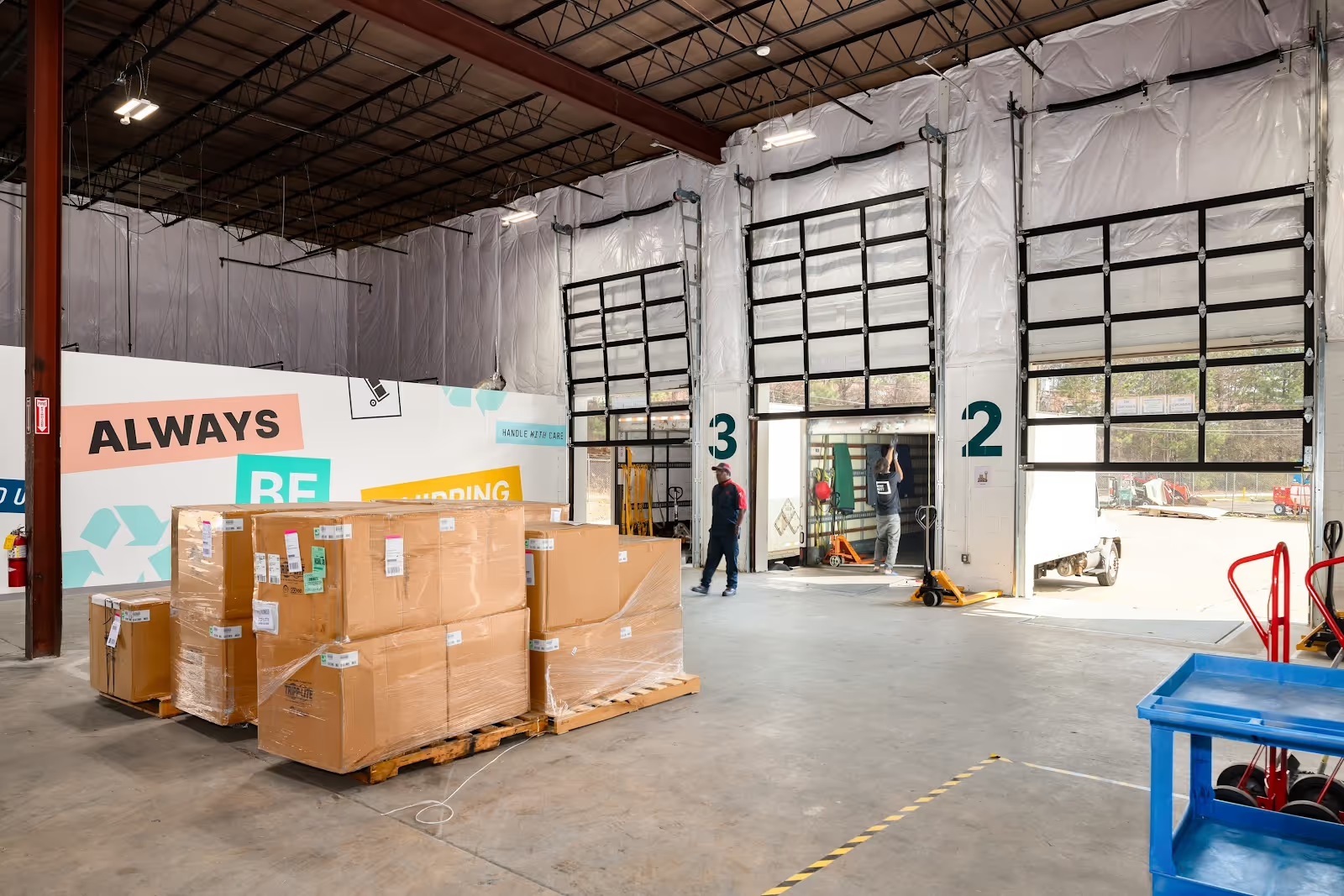Questions you can ask to find companies offering scalable space for logistics operations
Having space that scales when you do? Necessary. Finding companies that offer that scalable space? Seemingly impossible.
For any scaling business managing the flow of goods, information, and/or resources from one destination to another, it’s tempting to make quick decisions to solve immediate pain points. But without a long-term strategy — like understanding how to outsource logistics while keeping control of your operations — you risk compromising your efficiency, costs, and customer experience.
Since 2019, we've provided entrepreneurs across several industries with flexible warehouse space scales with them. Whether you’re shipping physical products, managing installations, offering creative services, or handling bulky equipment, this post will provide questions you can ask potential providers to understand if they truly offer scalable space.
Common types of warehouse solutions
When considering warehouse space, it's essential to recognize that not all options offer scalable space to support your operational growth effectively. Common types of warehouse solutions include in-house logistics setups, traditional third-party logistics (3PL) providers, and co-warehousing environments. Each of these models varies significantly in terms of scalability, flexibility, and control:
- In-house logistics setups provide full control over inventory and workflows but often require substantial capital investment and strong systems to manage growth, which can limit scalability.
- Traditional 3PL providers offer outsourced fulfillment and can handle large volumes; however, they typically operate with fixed contracts and limited flexibility, which may restrict your ability to scale space or services quickly.

On the other hand, co-warehousing environments combine shared warehouse space with tailored support, offering flexible warehouse solutions that can expand or contract as your needs change. This adaptability makes co-warehousing a compelling choice for companies seeking scalable space that aligns with their evolving logistics operations.
Key elements of a scalable warehousing solution: What questions to ask
1. How flexible are the warehousing terms and space options offered?
Understanding flexibility is crucial because it determines whether the provider can accommodate your changing needs as it grows or pivots. Providers with rigid contracts and fixed space allocations may limit your ability to scale efficiently, potentially leading to wasted costs or operational bottlenecks.
In contrast, warehousing partners offering adaptable terms and scalable space options empower you to adjust your storage and service levels quickly, ensuring your logistics operations remain aligned with your evolving customer demands.
2. Do you provide customized solutions tailored to my industry standards?
This question helps determine if the provider can adapt their services to meet the specific regulatory requirements and operational needs of your business. Customized warehousing solutions ensure that your logistics operations align with industry standards, whether that involves climate-controlled storage, specialized cold storage for food-grade products, or other dedicated warehousing services.
Choosing a partner with customized solutions is essential for optimizing efficiency, maintaining product integrity, and supporting scalable growth within your supply chain.
3. Can you support long-term commitments or short-term scaling needs?
Asking whether a provider can support long-term commitments or short-term scaling needs is crucial to understanding if their warehousing solution truly offers scalability. Businesses often face fluctuating demands, seasonal surges, or rapid growth phases, so a partner that accommodates both extended contracts and flexible, short-term adjustments ensures your logistics operations can adapt seamlessly.
This capability prevents overcommitment to unnecessary space or services while providing the agility needed to align with your evolving business requirements.
4. What kind of technology do you use for inventory control and real-time order status tracking?
The right technology, such as advanced warehouse management systems (WMS), ensures precise inventory control, enhances inventory accuracy, and provides real-time visibility into order status.
This level of transparency supports better decision-making, streamlines warehouse management, and enables faster order fulfillment—all essential factors for adapting logistics operations as your business grows and scales.
5. Do you offer value-added services like last mile delivery or reverse logistics?
These services enhance the efficiency and flexibility of your logistics operations, enabling seamless distribution and improved customer satisfaction.
Providers that include such value-added options demonstrate their ability to support your business growth by handling complex supply chain needs beyond basic storage, ensuring your warehousing solution can scale alongside your evolving demands.
6. How experienced are you with my industry/category?
Industry experience ensures the provider is familiar with the unique challenges, regulatory requirements, and operational standards of your sector. This expertise enables them to deliver customized warehousing solutions that support your growth, maintain product integrity, and adapt seamlessly as your business scales.
Choosing a partner with relevant industry knowledge helps ensure your logistics operations remain efficient, compliant, and aligned with your long-term supply chain strategy.
7. What is the geographic reach of your warehousing footprint?
A provider with a broad and strategically located network of facilities can support your growth by enabling faster order fulfillment, efficient freight management, and access to new markets.
Understanding the provider’s warehousing footprint helps you assess whether their storage space and distribution services can scale alongside your expanding logistics operations, ensuring your supply chain remains agile and responsive across multiple regions.
8. How do your storage solutions support product integrity?
Ensuring product integrity through specialized storage options—such as cold storage and food-grade warehousing—helps maintain the quality and safety of goods as your inventory grows or changes. Climate-controlled environments and strict adherence to industry standards are key factors that protect perishable and sensitive products, enabling your logistics operations to scale without compromising on quality.
Understanding how a provider safeguards product integrity gives you confidence that their storage solutions can adapt to your evolving business needs while preserving the value of your inventory.
9. Can you integrate with my existing supply chain strategy and operations?
This question helps determine whether the provider can seamlessly align their services with your current logistics processes, ensuring smooth coordination and minimal disruption. Integration capability is key to maintaining operational efficiency, enabling real-time inventory tracking, and supporting flexible adjustments as your business grows.
A warehousing partner that can adapt to your supply chain strategy not only streamlines workflows but also provides the scalability needed to accommodate evolving demands and optimize overall logistics performance.
10. What level of professional support and logistics expertise do you provide to help manage scaling challenges?
Access to experienced supply chain professionals ensures that your logistics operations can adapt smoothly as your business grows or pivots. Expert support helps navigate complex logistics challenges, implement continuous improvement initiatives, and maintain operational efficiency—key factors that enable your warehousing solution to scale effectively alongside your evolving needs.
11. How does your pricing and cost structures compare to other solutions?
Understanding the cost framework helps determine whether the provider offers transparent, flexible pricing that aligns with your growth needs. Competitive and adaptable pricing structures ensure you can scale your storage space and services without incurring unexpected expenses or long-term financial commitments.
This question enables you to evaluate cost-effectiveness, compare options, and select a partner that supports your logistics operations with scalable solutions tailored to your budget and evolving business demands.
Saltbox: Scalable space built for logistics operations

Saltbox memberships are the scalable space solution designed to answer all the questions in this article, no matter your size or growth stage.
We offer flexible plans tailored to meet your unique logistics, workspace, and operational needs—whether you’re just launching or scaling nationwide, Saltbox has the right membership for you. Miko Evans, who’s built his brand Meak Productions with Saltbox, put it best during our recent webinar, Freedom to flow: How to build a business that moves with you:
“What I love about Saltbox is the fact that… if your business grows and matures… you’re at a space where you can grow—and you have that support to grow. It’s not just about the space, it’s the one-on-one attention and the services that grow with you.”
From our entry-level Virtual membership to Access Plans and private Warehouse Workspaces, Saltbox memberships provide the perfect mix of space, services, and support to keep your logistics operations efficient and scalable.
Access Plans offer product-based businesses access to core logistics infrastructure—shipping, storage, receiving, and workspace—without the commitment of a full warehouse lease. They serve as a flexible gateway into the Saltbox ecosystem, enabling you to build and scale seamlessly through different growth stages.
Private Workspaces are ideal for fast-growing brands and freight operators who require daily facility access and dedicated storage. Choose the exact square footage you need now, with the flexibility to upgrade or downgrade as your business evolves. These spaces support project-based or field-based businesses needing dedicated warehouse suites for storing, prepping, and transporting materials.
Saltbox memberships empower you to centralize your logistics, customize your workspace, and grow without the growing pains. Our facilities combine flexible, secure, and technologically advanced solutions—complete with specialized storage options—to support diverse needs and seasonal demand fluctuations.

Scaling your logistics with Saltbox means more than just managing packages; it’s about supporting how your business truly works, whether that’s shipping orders, preparing installations, or coordinating projects. With Saltbox, you get a trusted, scalable space designed to keep your operations smooth, efficient, and future-ready—without long-term lease commitments.
No matter your business model or stage, Saltbox memberships provide the scalable warehousing solutions and tailored support you need to maximize efficiency and confidently grow your logistics operations.
Learn more about our membership tiers or book a tour to see how we change the game when it comes to warehouse space and industry expertise.
Frequently asked questions
For Her
For Him
For Pets
For Anyone

Related posts
Learn from businesses improving their operational efficiency. Explore how Saltbox’s expert support and flexible spaces drive their growth.


Black Friday ecommerce strategy: Complete 2025 guide to maximize holiday sales
Discover a comprehensive Black Friday ecommerce strategy for 2025 to maximize your holiday sales. Learn expert tips on technical optimization, targeted marketing, inventory planning, and customer retention to boost your online store’s performance during the busiest shopping season.


The ultimate small business holiday gift guide 2025
Every item in this guide comes from a Saltbox member. Thoughtfully made, ready to ship, and powered by small businesses.


Holiday shipping deadlines 2025: Complete guide for on-time delivery
This comprehensive guide covers every major carrier’s 2025 holiday shipping deadlines, from standard ground services to last-minute express options.







